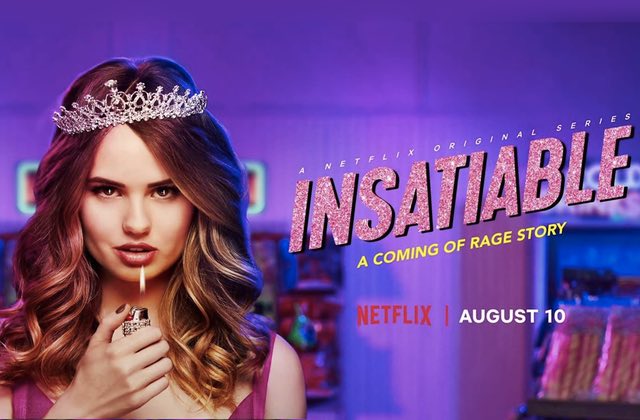Skinny Is Pretty
Earlier last month, Netflix released its new show Insatiable. Since its release, the comedy–produced by Lauren Gussis and featuring former Disney Channel star Debby Ryan–received multiple critiques from the public, and a sad 10% approval on Rotten Tomatoes (“Insatiable: Season 1”). Even before its drop, Insatiable was already causing major social media turmoil. As Netflix released a 90-second trailer which showcased the main character Patty as fat-gone-skinny, the public went crazy in response. Petitions urging Netflix not to air the show due to perceived fat shaming and fat-phobic stereotypes gathered over 200,000 signatures from all over the world.
Insatiable is not just a weight-loss story. It’s not a revenge story either. It’s not even about rage, actually. Insatiable has two main plotlines: the first brings the viewer into Patty Bladell’s life, an overweight teenager who has her jaw wired shut due to an attack in a parking lot. As a result, the protagonist shows up back to school 30 kilos lighter. The second plot focuses on Bob Armstrong, a lawyer who dreams of being a successful beauty-pageant coach. Although Insatiable does have some flaws and characters filled with rage and revenge, the show goes much deeper than that. It is about how the things we think we want can shape us, and about what happens when we don’t like the people we become. Gussis told The Hollywood Reporter, “I wanted to tell, in theory, a story where the characters’ desires are deeply rooted in real human emotion, but the things that happen are so crazy that it’s less scary to have a conversation when you know you’re in a world that isn’t quite reality.”
However, does Insatiable really fat-shame Patty? The show puts a great deal of care into handling that aspect of the story. Patty’s body-image issues are constantly being treated with care and caution, and the aspect of internal versus external beauty is greatly enforced during the show. Obviously, though, the show is not perfect either. Earlier in the series, Bob Armstrong exclaims that “skinny is magic.” The show has controversial ideas, and those are shown throughout each episode. In some episodes, the main character even uses her body as leverage in court in order to go from a ‘loser’ to a ‘winner’, and immediately becomes a genuine competition in the town’s local beauty pageant, Miss Magic Jesus.
The idea that skinny is magic eventually delivers superficial rewards, while not necessarily making the main character any happier than she was before. Today, small, female bodies are still preferred over larger body types. Overweight women still earn less money and are less likely to work in physically demanding jobs, but these realities aren’t talked about (Alsop, 1). Therefore, when a show like Insatiable is released, it adds to the group of taboo articles that discuss weight and body-image issues. So, what if you’re not a happy, fat girl, and have a story to tell? The common notion that stories about a desire to lose weight should be off limits to fat people piles up as one more thing they need to give up. The ability to discuss how you feel about your body will be one more form of “thin privilege”.
Weight loss stories like the one featured in Insatiable not only discuss real-life situations regarding societal pressures to adapt to the “norm”, but also provide an opportunity to debate if it is really worth it. The show makes a clear attempt to demonstrate that changing how you look on the outside will not change how you feel on the inside. Weight loss doesn’t fix Patty Bladell: it breaks her even more.
Works Cited
Alsop, Ronald. “Capital – Fat People Earn Less and Have a Harder Time Finding Work.” BBC News, BBC, 1 Dec. 2016, www.bbc.com/capital/story/20161130-fat-people-earn-less-and-have-a-harder-time-finding-work.
Gussis, Lauren. Insatiable, performance by Debby Ryan, season Season 1, Netflix, 2018.
“Insatiable: Season 1 (2018).” Rotten Tomatoes, Fandango, 2018, www.rottentomatoes.com/tv/insatiable/s01/.

It is Noah's second year in the Talon as a Features Writer. She is a Senior and has been at Graded since she was four years old. As a true communicator,...









